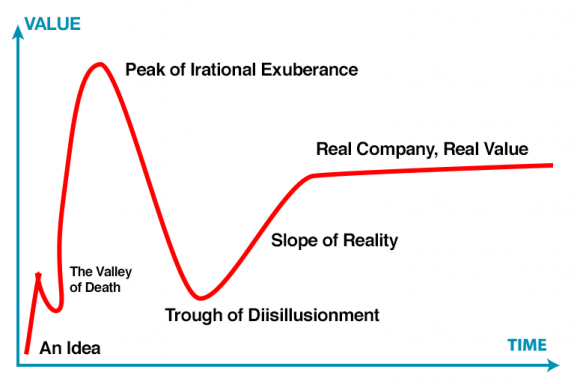
Outside of California, where it feels like all investors are professional investors, and following up on last week’s post about one difference between Angel and professional investors, another difference is the way the deal terms get set, especially valuation.
First-time entrepreneurs don’t understand how startups gets valued. Neither do first-time startup investors.
In my MBA class and in Fledge, I explain that the the logic is counter-intuitive, that the value has far more to do with the investor than the company. To simplify the answer down to a sentence: the value of the company is the amount of capital being raised divided by the percent ownership remaining with the founders.
I explain the details of that in The Next Step: The realities of funding a startup but in this post, I want to explain how it is determined how this works in practice., as it works differently for Angel-funded vs. VC-funded companies.
In the 20 years I spent in “tech”, I founded and built venture-scale companies funded by VCs. In that tiny sliver of entrepreneurship, the norms are simple. We entrepreneurs pitch, and the VCs respond by offering a value and accompanying terms. Actually more often than not they say “no”, or silently mean “no”, but when they say yes, they set the price. It’s negotiable, as some of the terms, but the key is that they determine what the company is worth. Entrepreneurs can, and sometime do, turn down offers from VCs, but as those offers are exceedingly hard to come by, most are taken, and taken at the price offered.
Meanwhile, in nearly all Angel-funded deals I’ve seen, the entrepreneurs set the price. They do the dog-and-pony pitch, then end with the amount of the raise, the general terms, and either a pre-money valuation or a cap on the convertible note. When my fledglings do this, they often ask my advice and the advice of others, but in the end the entrepreneur put a value on a slide, and few Angels ever negotiate that price.
I was a venture-scale entrepreneur first, and thus the first few times I was pitched as an Angel, I asked where that valuation came from, and I was quite surprised at the answer. I still always ask that question when pitched, as it still strikes me as backwards.
The reasoning is sound for the difference. The VCs are professionals, investing multiple times per year, and hold nearly all the power in the startup/funder relationship. They know the current trends in valuations, more than the entrepreneurs. Plus for Series A, the negotiations usually have just three parties, the startup and two VCs, and the two VCs both want the lowest valuation possible.
Meanwhile, here in Seattle, there is usually no big investor to negotiate the deal. In the follow-on funding for the fledglings and in the Angel deals I’ve done personally, often all the investors are nearly equal in size. In these deals, its hard enough to get an Angel or two or three to step up to do the due diligence, let alone step up further to negotiate the valuation.
This seems another of the many flaws in startup funding.
Dozens of times I’ve seen pitches at pitch events where the valuation proposed is well outside the norm. $10 million valuations and $5 million caps on convertible notes, with nothing built, no customers, just the idea and a bad PowerPoint. Or $x00,000 for just 5% or 10% of the company. In all these cases, the Angels quickly dismissed the deals, chalking up the entrepreneurs as naive, rather than explaining to them what they did wrong and providing a counter-offer that would make sense to both sides.
All this said, this isn’t a problem I see getting fixed by the market. Most equity crowdfunding following the Angel model, with the company picking a valuation when creating the online profile.
The only hope is education of the Angels, to let them know that prices are not set in stone. That everything is negotiable. Plus a bit of education for entrepreneurs, who should ask the first 5 Angels they encounter for advice rather than money, to ensure they are not wasting everyone’s time with a crazy valuation and crazy terms.














